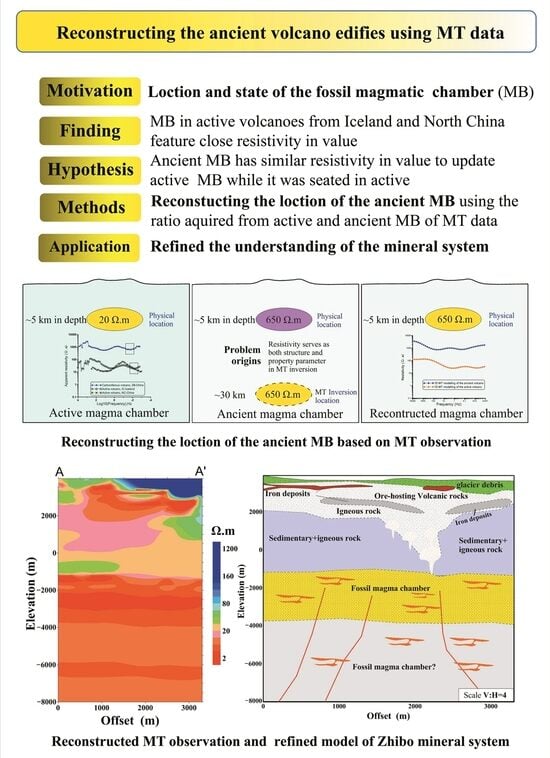Reconstruction of Ancient Carboniferous Zhibo Volcanic Edifices in Western China Using Magnetotelluric Observations and Comparisons with Active Volcanoes
Abstract
1. Introduction
2. Geological Setting
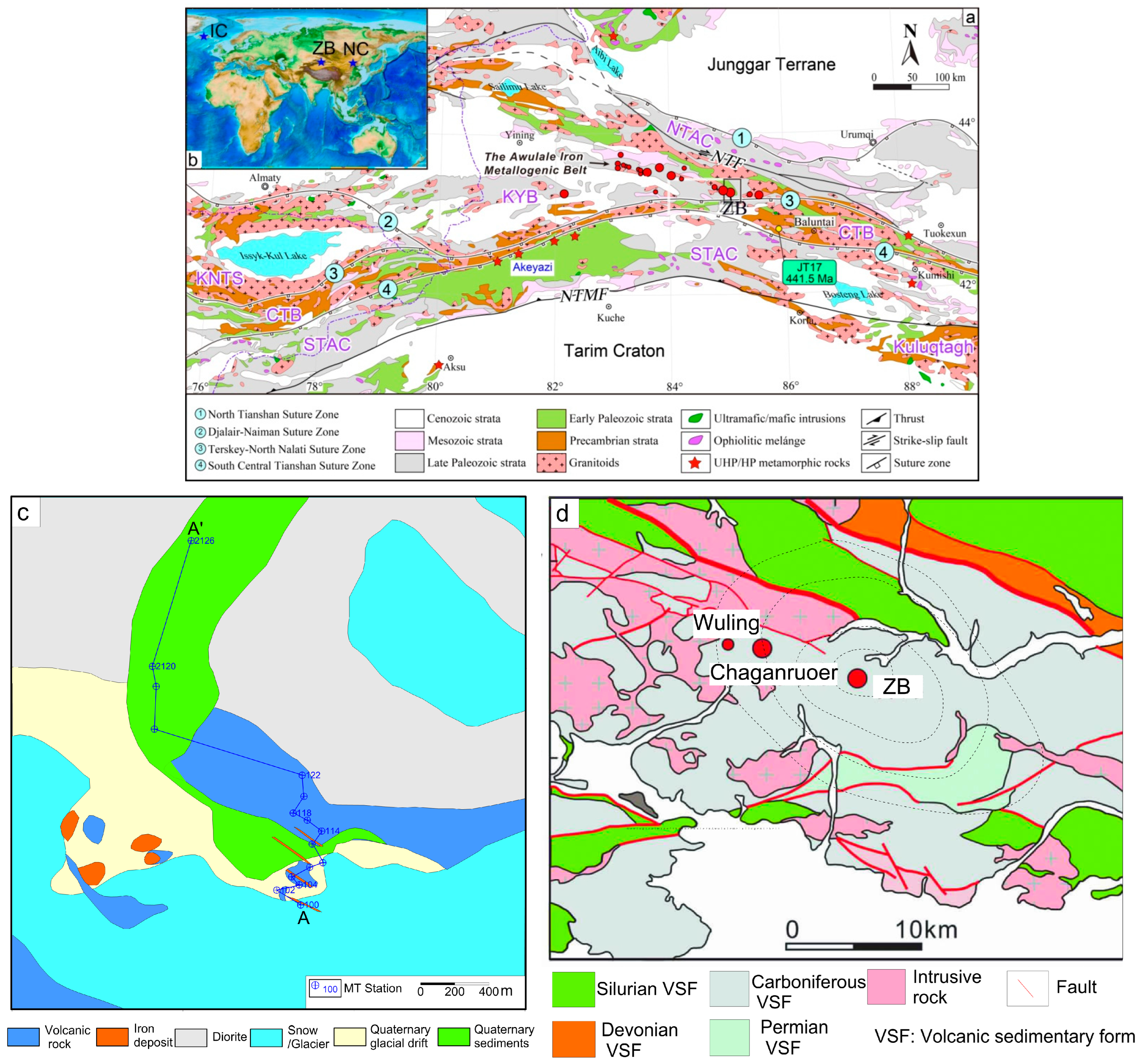
3. Data and Methods
4. Results
5. Discussion
5.1. Determining the Reconstruction Correction Ratio
5.2. Improved Understanding of Marine Volcanic-Hosted ZB Iron Deposits
6. Conclusions
Author Contributions
Funding
Data Availability Statement
Acknowledgments
Conflicts of Interest
Appendix A
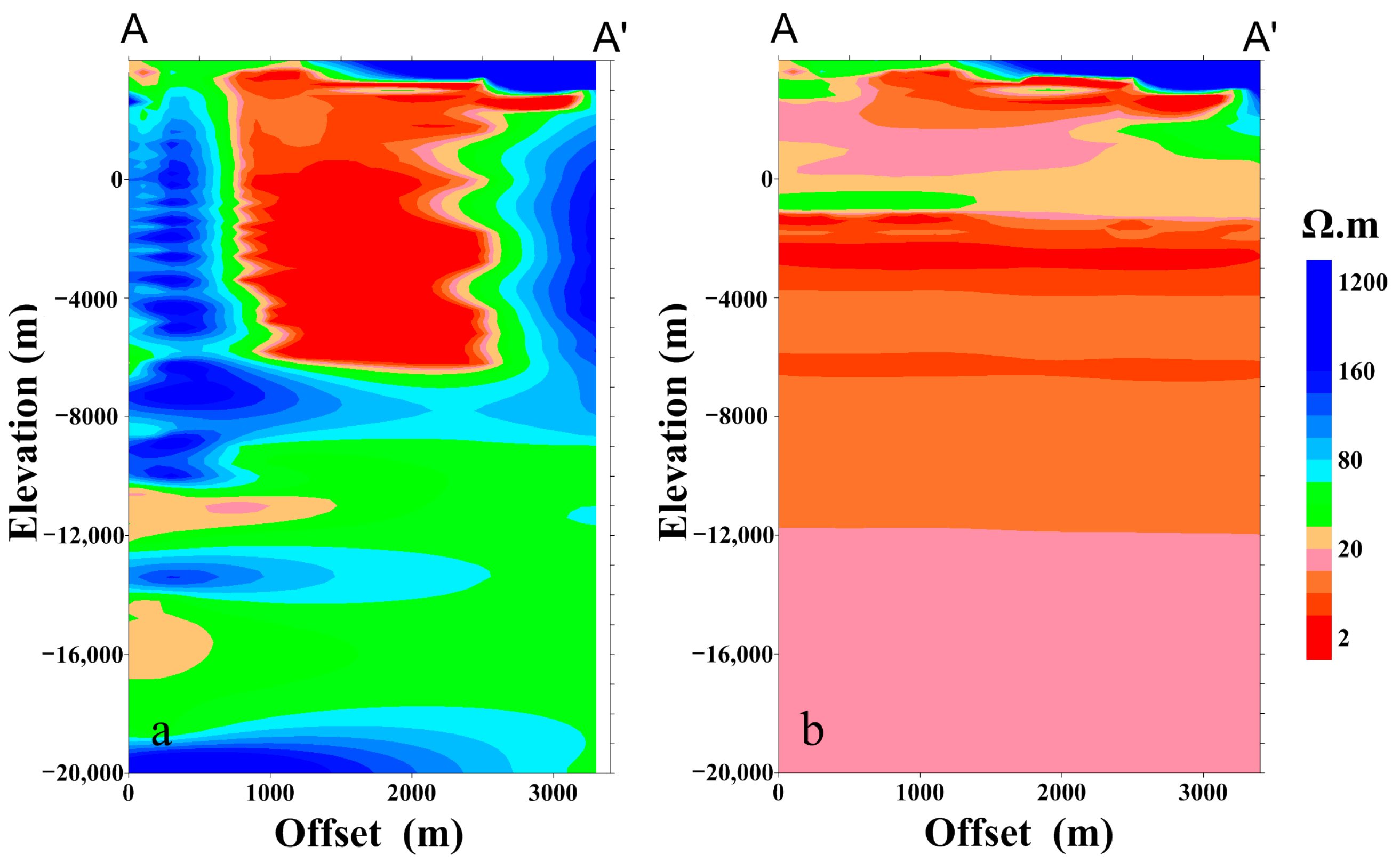

References
- Kusky, T.M. Volcanoes: Eruptions and Other Volcanic Hazards; Infobase Publishing: New York, NY, USA, 2008. [Google Scholar]
- Fischer, T.P.; Arellano, S.; Carn, S.; Aiuppa, A.; Galle, B.; Allard, P.; Lopez, T.; Shinohara, H.; Kelly, P.; Werner, C.; et al. The emissions of CO2 and other volatiles from the world’s subaerial volcanoes. Sci. Rep. 2019, 9, 18716. [Google Scholar] [CrossRef]
- Fournier, T.; Freymueller, J.; Cervelli, P. Tracking magma volume recovery at Okmok volcano using GPS and an unscented Kalman filter. J. Geophys. Res. 2009, 114, B02405. [Google Scholar] [CrossRef]
- Phillipson, G.G.; Sobradelo, R.; Gottsmann, J.H. Global volcanic unrest in the 21st century: An analysis of the first decade. J. Volcanol. Geotherm. Res. 2013, 264, 183–196. [Google Scholar] [CrossRef]
- Lopes, R. The Volcano Adventure Guide; Cambridge University Press: Cambridge, UK, 2005. [Google Scholar]
- Stoffel, M.; Khodri, M.; Corona, C.; Guillet, S.; Poulain, V.; Bekki, S.; Guiot, J.; Luckman, B.H.; Oppenheimer, C.; Lebas, N.; et al. Estimates of volcanic-induced cooling in the Northern Hemisphere over the past 1500 years. Nat. Geosci. 2015, 8, 784–788. [Google Scholar] [CrossRef]
- Sharp, A.D.L.; Davis, P.M.; Gray, F. A low velocity zone beneath Mount Etna and magma storage. Nature 1980, 287, 587–591. [Google Scholar] [CrossRef]
- Stanley, W.D.; Mooney, W.D.; Fuis, G.S. Deep crustal structure of the Cascade Range and surrounding regions from seismic refraction and magnetotelluric data. J. Geophys. Res. B Solid Earth 1990, 95, 19419–19438. [Google Scholar] [CrossRef]
- Jaxybulatov, K.; Shapiro, N.M.; Koulakov, I.; Mordret, A.; Landès, M.; Sens-Schönfelder, C. A large magmatic sill complex beneath the Toba caldera. Science 2014, 346, 617–619. [Google Scholar] [CrossRef]
- Gudmundsson, M.T.; Jónsdóttir, K.; Hooper, A.; Holohan, E.P.; Halldórsson, S.A.; Ófeigsson, B.G.; Cesca, S.; Vogfjörd, K.S.; Sigmundsson, F.; Högnadóttir, T.; et al. Gradual caldera collapse at Bárdarbunga volcano, Iceland, regulated by lateral magma outflow. Science 2016, 353, aaf8988. [Google Scholar] [CrossRef]
- Gansecki, C.; Lee, R.L.; Shea, T.; Lundblad, S.P.; Hon, K.; Parcheta, C. The tangled tale of Kīlauea’s 2018 eruption as told by geochemical monitoring. Science 2019, 366, eaaz0147. [Google Scholar] [CrossRef]
- Debayle, E.; Bodin, T.; Durand, S.; Ricard, Y. Seismic evidence for partial melt below tectonic plates. Nature 2020, 586, 555–559. [Google Scholar] [CrossRef]
- Bai, D.H.; Meju, M.A.; Liao, Z.J. Magnetotelluric images of deep crustal structure of the Rehai geothermal field near Tengchong, southern China. Geophys. J. Int. 2001, 147, 677–687. [Google Scholar] [CrossRef]
- Takakura, S.; Matsushima, N. Magnetotelluric Investigation of the Hydrothermal System and Heat Source in the Muine–Toyoha Geothermal Area, Hokkaido, Japan. Resour. Geol. 2003, 53, 213–220. [Google Scholar] [CrossRef]
- Azeez, K.K.A.; Harinarayana, T. Magnetotelluric evidence of potential geothermal resource in Puga, Ladakh, NW Himalaya. Curr. Sci. 2007, 93, 324–329. [Google Scholar]
- Hill, G.J.; Caldwell, T.G.; Heise, W.; Chertkoff, D.G.; Bibby, H.M.; Burgess, M.K.; Cull, J.P.; Cas, R.A. Distribution of melt beneath Mount St Helens and Mount Adams inferred from magnetotelluric data. Nat. Geosci. 2009, 2, 785–789. [Google Scholar] [CrossRef]
- Bertrand, E.A.; Caldwell, T.G.; Hill, G.J.; Wallin, E.L.; Bennie, S.L.; Cozens, N.; Onacha, S.A.; Ryan, G.A.; Walter, C.; Zaino, A.; et al. Magnetotelluric imaging of upper-crustal convection plumes beneath the Taupo Volcanic Zone, New Zealand. Geophys. Res. Lett. 2012, 39, L02304. [Google Scholar] [CrossRef]
- Al Habib, J.; Setijadji, L.D.; Maryono, A.; Rompo, I. Identification of Paleovolcanic Centers in the Bima District, East Sumbawa Island (Indonesia) as Guidance for Future Exploration of Cu–Au Deposits. J. Applied Geol. 2024, 9, 64–75. [Google Scholar] [CrossRef]
- Liu, Q.; Xuan, F.; Liu, C.; Minghe Zhang, M.H.; Tian, Y.; Hou, H.S. Metallic mineral exploration by using ambient noise tomography in Ashele copper mine, Xinjiang, China. Geophysics 2022, 87, B221–B231. [Google Scholar] [CrossRef]
- Poland, M.P.; Miklius, A.; Sutton, A.J.; Thornber, C.R. A mantle-driven surge in magma supply to Kīlauea Volcano during 2003–2007. Nat. Geosci. 2012, 5, 295–300. [Google Scholar] [CrossRef]
- Gao, J.; Zhang, H.J.; Zhang, S.Q.; Xin, H.L.; Li, Z.W.; Tian, W.; Bao, F.; Cheng, Z.P.; Jia, X.F.; Fu, L. Magma re-charging beneath the Weishan volcano of the intraplate Wudalianchi volcanic field, northeast China, implied from 3-D magnetotelluric imaging. Geology 2020, 48, 913–918. [Google Scholar] [CrossRef]
- Spichak, V.V.; Borisova, V.P.; Fainberg, E.B.; Khalezov, A.A.; Goidina, A.G. Electromagnetic 3D Tomography of the Elbrus Volcanic Center According to Magnetotelluric and Satellite Data. J. Volcanol. Seismolog. 2007, 1, 53–66. [Google Scholar] [CrossRef]
- Park, S.K.; Ostos, L.C. Constraints from magnetotelluric measurements on magmatic processes and upper mantle structure in the vicinity of Lassen volcanic center, northern California. Geosphere 2013, 9, 382–393. [Google Scholar] [CrossRef]
- Tsukamoto, K.; Aizawa, K.; Chiba, K.; Kanda, W.; Uyeshima, M.; Koyama, T.; Utsugi, M.; Seki, T.; Kishita, T. Three Dimensional Resistivity Structure of Iwo-Yama Volcano, Kirishima Volcanic Complex, Japan: Relationship to Shallow Seismicity, Surface Uplift, and a Small Phreatic Eruption. Geophys. Res. Lett. 2018, 45, 12821–12826. [Google Scholar] [CrossRef]
- He, L.F.; Chen, L.; Dorji; Xi, X.L.; Zhao, X.F.; Chen, R.J.; Yao, H.C. Mapping the Geothermal System Using AMT and MT in the Mapamyum (QP) Field, Lake Manasarovar, Southwestern Tibet. Energies 2016, 9, 855. [Google Scholar] [CrossRef]
- Pang, G.; Abers, G.A.; Moran, S.C.; Thelen, W.A. Long-lived partial melt beneath Cascade Range volcanoes. Nat. Geosci. 2025, 18, 184–190. [Google Scholar] [CrossRef]
- Gudmundsson, A. Infrastructure and mechanics of volcanic systems in Iceland. J. Volcanol. Geotherm. Res. 1995, 64, 1–22. [Google Scholar] [CrossRef]
- Gudmundsson, M.T.; Larsen, G.; Höskuldsson, Á.; Gylfason, Á.G. Volcanic hazards in Iceland. Jökull 2008, 58, 251–268. [Google Scholar] [CrossRef]
- Lee, B.; Unsworth, M.; Árnason, K.; Cordell, D. Imaging the magmatic system beneath the Krafla geothermal field, Iceland: A new 3-D electrical resistivity model from inversion of magnetotelluric data. Geophys. J. Int. 2020, 220, 541–567. [Google Scholar] [CrossRef]
- Shi, Z.W.; Bai, Z.D.; Zhao, Z.D.; Dong, G.C.; Wang, J.W.; Jin, D.B. Late Cenozoic sequence of volcanic eruptions in the Xilinhot area, Inner Mongolia. Acta Petrol. Sin. 2024, 40, 2087–2102. [Google Scholar] [CrossRef]
- Wei, H.; Sparks, R.S.; Liu, R.; Fan, Q.; Wang, Y.; Hong, H.; Zhang, H.; Chen, H.; Jiang, C.; Dong, J.; et al. Three active volcanoes in China and their hazards. J. Asian Earth Sci. 2003, 21, 515–526. [Google Scholar] [CrossRef]
- Gao, J.; Long, L.L.; Klemd, R.; Qian, Q.; Liu, D.Y.; Xiong, X.M.; Su, W.; Liu, W.; Wang, Y.T.; Yang, F.Q. Tectonic evolution of the South Tianshan orogen and adjacent regions, NW China: Geochemical and age constraints of granitoid rocks. Int. J. Earth Sci. 2009, 98, 1221–1238. [Google Scholar] [CrossRef]
- Wang, X.S.; Zhang, X.; Gao, J.; Li, J.L.; Jiang, T.; Xue, S.C. A slab break-off model for the submarine volcanic-hosted iron mineralization in the Chinese Western Tianshan: Insights from Paleozoic subduction-related to post-collisional magmatism. Ore Geol. Rev. 2018, 92, 144–160. [Google Scholar] [CrossRef]
- Wan, B.; Wang, X.S.; Liu, X.J.; Cai, K.D.; Xiao, W.J.; Mitchell, R.N. Long-lived seamount subduction in ancient orogens: Evidence from the Paleozoic South Tianshan. Geology 2021, 49, 531–535. [Google Scholar] [CrossRef]
- Xiao, W.J.; Windley, B.F.; Allen, M.B.; Han, C.M. Paleozoic multiple accretionary and collisional tectonics of the Chinese Tianshan orogenic collage. Gondwana Res. 2013, 23, 1316–1341. [Google Scholar] [CrossRef]
- Zhang, K.J.; Zhang, Y.X.; Tang, X.C.; Xia, B. Late Mesozoic tectonic evolution and growth of the Tibetan plateau prior to the Indo–Asian collision. Earth Sci. Rev. 2012, 114, 236–249. [Google Scholar] [CrossRef]
- Zhang, K.J.; Ji, C.; Zhou, Y.Z.; Zhang, Y.J. Tracing oceanic plateau relics in the basement of mainland China: A synthesis of aeromagnetic and seismic refraction data. Earth Sci. Rev. 2024, 255, 104849. [Google Scholar] [CrossRef]
- Hou, T.; Zhang, Z.C.; Pirajno, F.; Santosh, M.; Encarnacion, J.; Liu, J.L.; Zhao, Z.D.; Zhang, L. Geology, tectonic settings and iron ore metallogenesis associated with submarine volcanism in China, An overview. Ore Geol. Rev. 2014, 57, 498–517. [Google Scholar] [CrossRef]
- Zhang, X.; Tian, J.Q.; Gao, J.; Klemd, R.; Dong, L.H.; Fan, J.J.; Tuo, J.; Hu, C.J.; Qian, Q. Geochronology and geochemistry of granitoid rocks from the ZB syngenetic volcanogenic iron ore deposit in the Western Tianshan Mountains (NW-China): Constraints on the age of mineralization and tectonic setting. Gondwana Res. 2012, 22, 585–596. [Google Scholar] [CrossRef]
- Jiang, Z.S.; Zhang, Z.H.; Wang, Z.H.; Duan, S.G.; Li, F.M.; Tian, J. Geology, geochemistry, and geochronology of the ZB iron deposit in the Western Tianshan, NW China: Constraints on metallogenesis and tectonic setting. Ore Geol. Rev. 2014, 57, 406–424. [Google Scholar] [CrossRef]
- Zhang, X. The Metallogenic Tectonic Setting and Metallogenesis of the ZB and Chagangnuoer Iron Ore Deposits, Western Tianshan Mountains. Ph.D. Thesis, University of Chinese Academy of Sciences, Beijing, China, 2013. (In Chinese). [Google Scholar]
- Zhang, X.; Klemd, R.; Gao, J.; Dong, L.H.; Wang, X.S.; Haase, K.; Jiang, T.; Qian, Q. Metallogenesis of the ZB and Chagangnuoer volcanic iron oxide deposits in the Awulale Iron Metallogenic Belt, Western Tianshan orogen, China. J. Asian Earth Sci. 2015, 113, 151–172. [Google Scholar] [CrossRef]
- Shen, P.; Pan, H.D.; Li, C.H.; Feng, H.X.; Wu, Y.; Shi, F.P.; Guo, X.C.; Li, W.G. Carboniferous ore-controlling volcanic apparatus and metallogenic models for the large-scale iron deposits in the Western Tianshan, Xinjiang. Acta Petrol. Sin. 2021, 36, 2845–2868, (In Chinese with English Abstract). [Google Scholar]
- Shen, L.J.; Du, Y.S.; Wang, S.X.; Li, D.P.; Ge, S.S.; Wang, K. Magmatic and hydrothermal mineralization of the ZB iron deposit in the western Tian Shan, Xinjiang: Evidence from andesite mineralogy. Geol. Explor. 2014, 50, 0321–0331, (In Chinese with English Abstract). [Google Scholar]
- Luo, W.J.; Zhang, Z.H.; Duan, S.G.; Jiang, Z.S.; Wang, D.C.; Chen, J.; Sun, J. Geochemistry of the ZB submarine intermediate–mafic volcanic rocks and associated iron ores, Western Tianshan, Northwest China: Implications for ore genesis. Geol. J. 2018, 53, 3147–3172. [Google Scholar] [CrossRef]
- Wang, Z.H.; Zhang, Z.H.; Jiang, Z.S.; Wei, H.; Tian, J.Q. Magnetite composition of ZB iron deposit in western Tianshan mountains and its genetic significance. Miner. Depos. 2012, 31, 983–998. [Google Scholar]
- Guo, Z.W.; Xue, G.Q.; Liu, J.X.; Wu, X. Electromagnetic methods for mineral exploration in China: A review. Ore Geol. Rev. 2020, 118, 103357. [Google Scholar] [CrossRef]
- Vozoff, K. Magnetotellurics: Principles and practice. Proc. Indian Acad. Sci.–Earth Planet. Sci. 1990, 99, 441–471. [Google Scholar] [CrossRef]
- He, L.F.; Chen, L.; Dorji; He, Z.X.; Wang, X.B.; Xiao, B.Y.; Xu, L.G.; Zhao, X.F.; Xi, X.L.; Yao, H.C.; et al. Mapping chromite deposits with audio magnetotellurics in the Luobusa ophiolite of southern Tibet. Geophysics 2018, 83, B47–B57. [Google Scholar] [CrossRef]
- Asch, T.H.; Sweetkind, D.S. Audio magnetotelluric characterization of range-front faults, Snake Range, Nevada. Geophysics 2011, 76, B1–B7. [Google Scholar] [CrossRef]
- Garcia, X.; Julià, J.; Nemocón, A.M.; Neukirch, M. Lithospheric thinning under the Araripe Basin (NE Brazil) from a long-period magnetotelluric survey: Constraints for tectonic inversion. Gondwana Res. 2019, 68, 174–184. [Google Scholar] [CrossRef]
- Torres-Verdin, C.; Bostick, F.X., Jr. Principles of spatial surface electric field filtering in magnetotellurics: Electromagnetic array profiling (EMAP). Geophysics 1992, 57, 603–622. [Google Scholar] [CrossRef]
- Goldberg, S.; Loewenthal, D.; Rotstein, Y. An improved algorithm for magnetotelluric and direct current data interpretation. J. Geophys. 1982, 50, 151–158. [Google Scholar]
- Whittall, K.P.; Oldenburg, D.W. Inversion of magnetotelluric data for a one-dimensional conductivity. In Geophysical Monograph Series; Society of Exploration Geophysicists: Tulsa, OK, USA, 1992. [Google Scholar]
- Goldberg, S.; Rotstein, Y. A simple form of presentation of magnetotelluric data using the Bostick transform. Geophys. Prospect. 1982, 30, 211–216. [Google Scholar] [CrossRef]
- Jiracek, G.R. Near-surface and topographic distortions in electromagnetic induction. Surv. Geophys. 1990, 11, 163–203. [Google Scholar] [CrossRef]
- Piña-Varas, P.; Ledo, J.; Queralt, P.; Marcuello, A.; Perez, N. On the detectability of Teide volcano magma chambers (Tenerife, Canary Islands) with magnetotelluric data. Earth Planets Space 2018, 70, 14. [Google Scholar] [CrossRef]
- Yang, B.; Lin, W.L.; Hu, X.Y.; Fang, H.; Qiu, G.G.; Wang, G. The magma system beneath Changbaishan–Tianchi Volcano, China/North Korea: Constraints from three-dimensional magnetotelluric imaging. J. Volcanol. Geotherm. Res. 2021, 419, 107385. [Google Scholar] [CrossRef]
- Wang, Q.; Bagdassarov, N.; Xia, Q.K.; Zhu, B. Water contents and electrical conductivity of peridotite xenoliths from the North China Craton: Implications for water distribution in the upper mantle. Lithos 2014, 189, 105–126. [Google Scholar] [CrossRef]
- Zhang, B.H.; Yoshino, T.; Wu, X.P.; Matsuzaki, T.; Shan, S.M.; Katsura, T. Electrical conductivity of enstatite as a function of water content: Implications for the electrical structure in the upper mantle. Earth Planet. Sci. Lett. 2012, 357–358, 11–20. [Google Scholar] [CrossRef]
- Zhang, B.H.; Zhao, C.C.; Ge, J.H.; Yoshino, T. Electrical conductivity of omphacite as a function of water content and implications for high conductivity anomalies in the Dabie–Sulu UHPM belts and Tibet. J. Geophys. Res. Solid Earth 2019, 124, 12523–12536. [Google Scholar] [CrossRef]
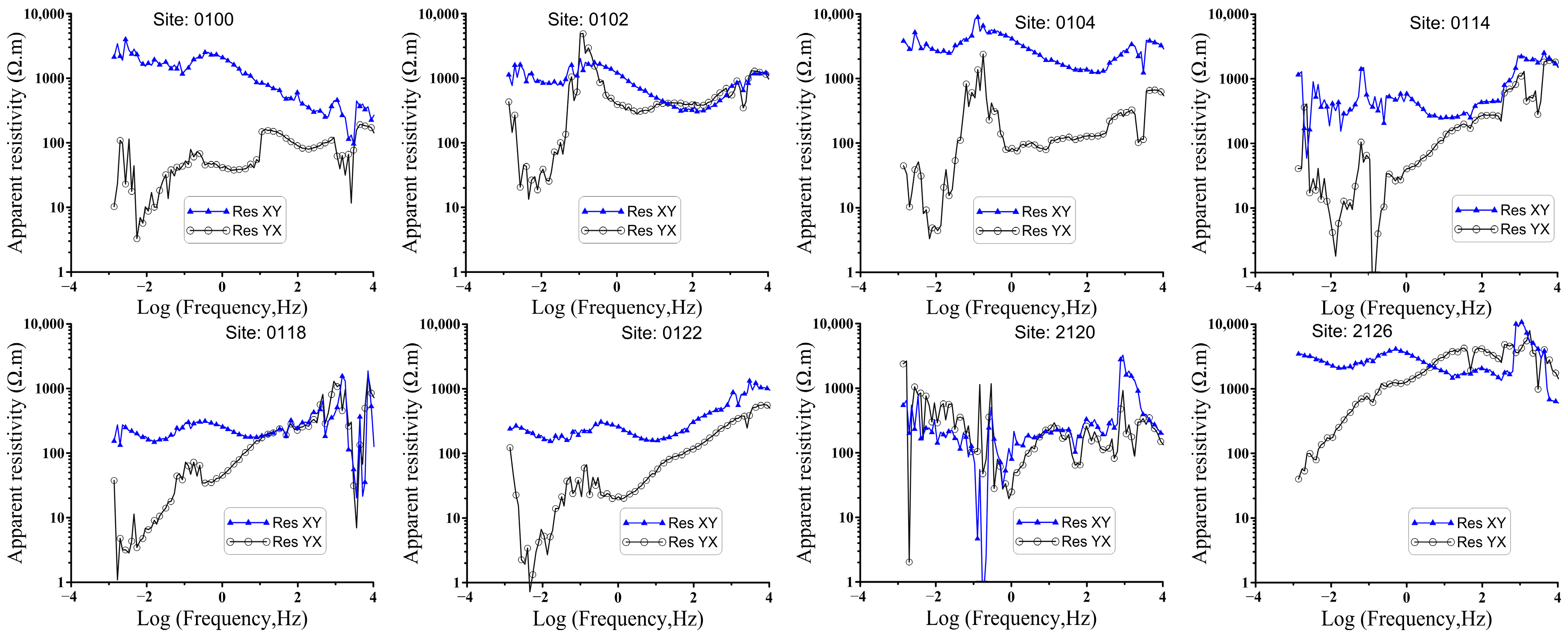
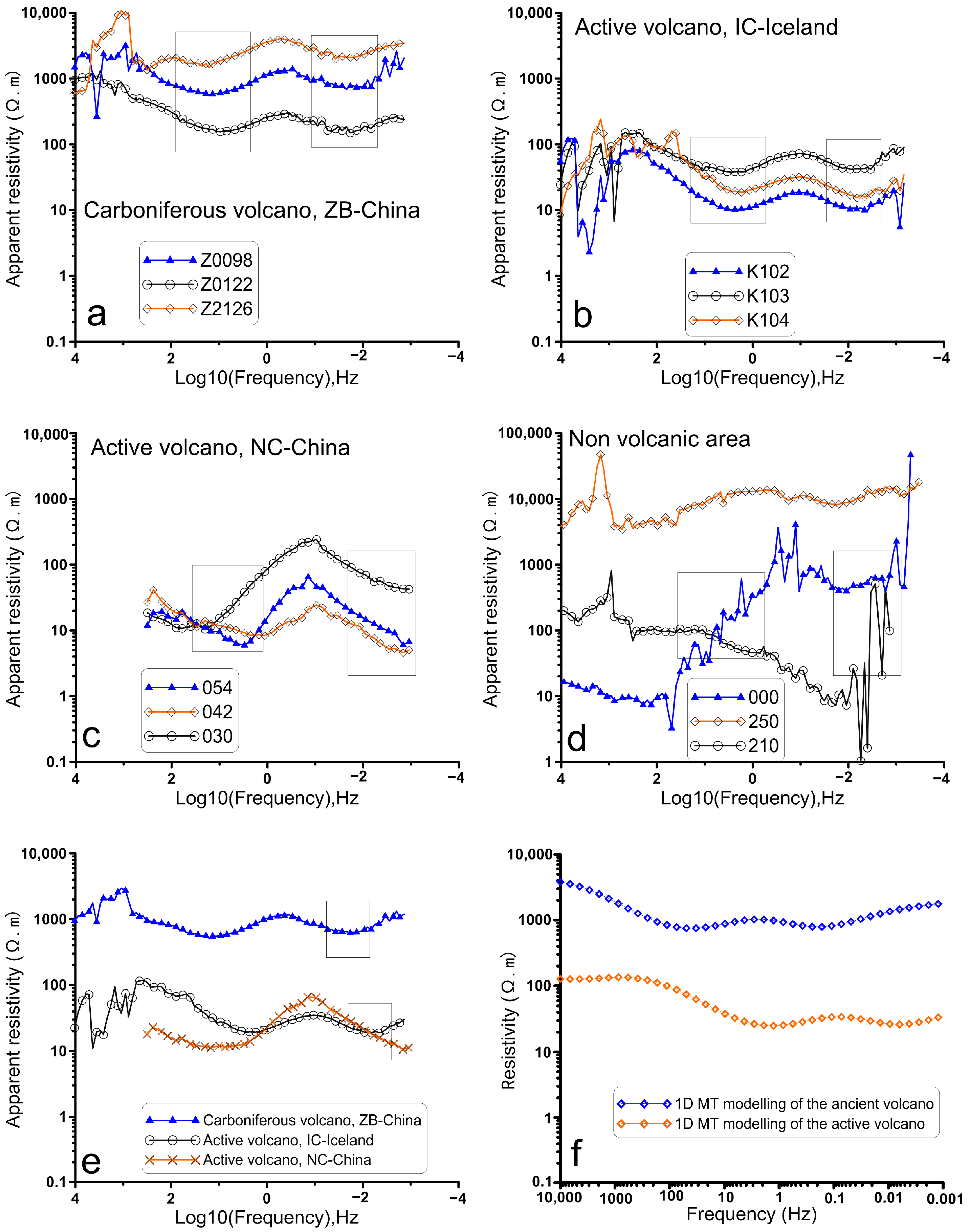
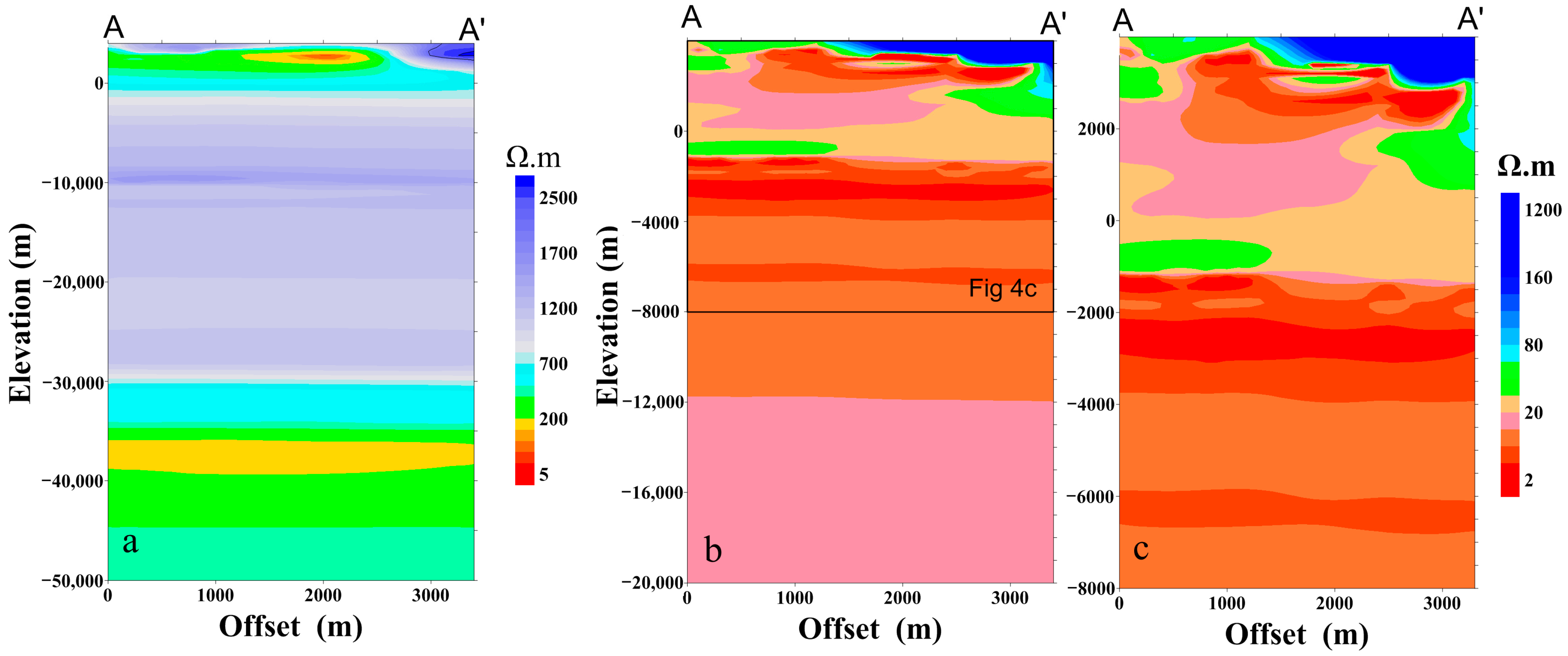
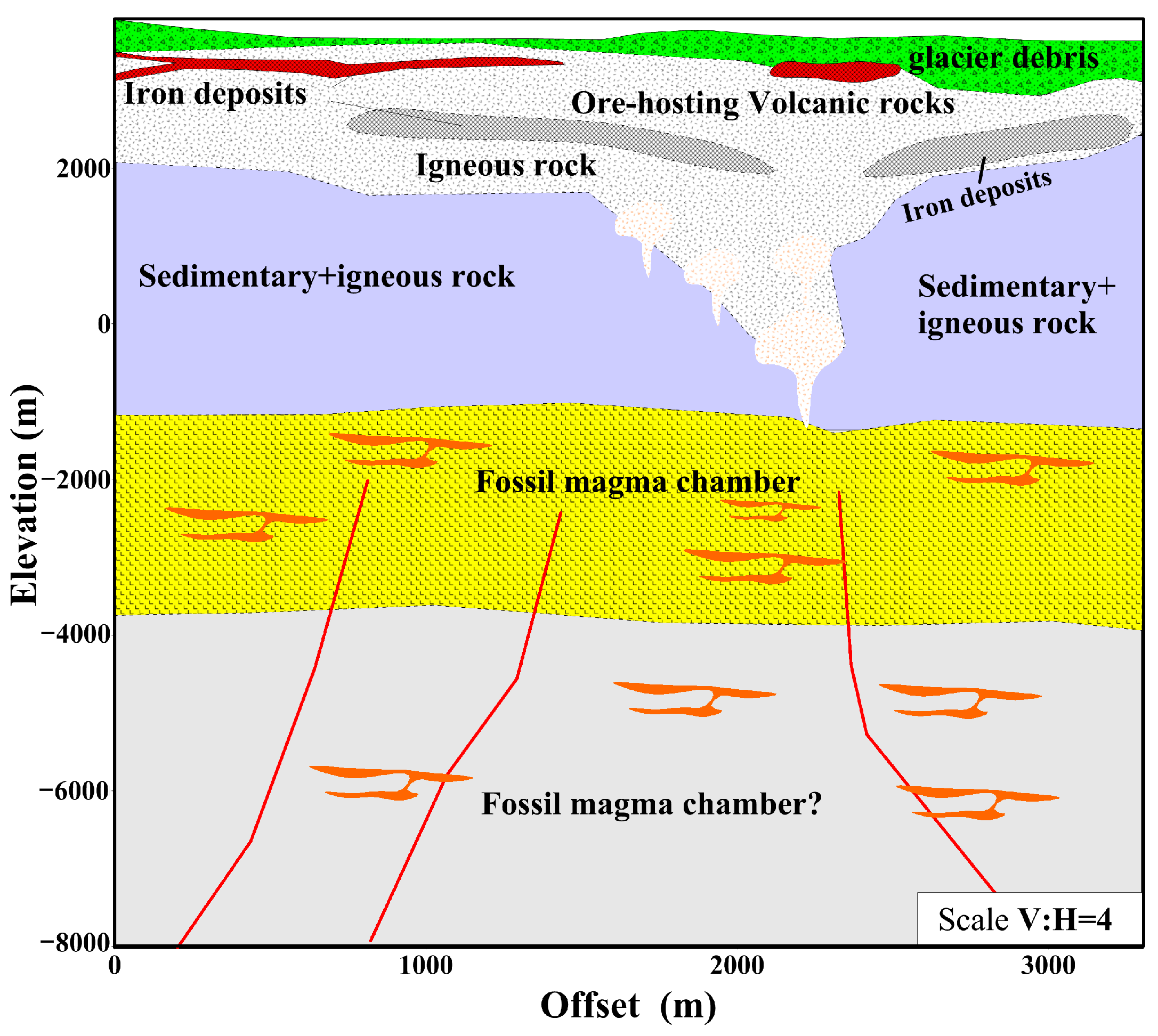
| Number | Rxy-IC | Rxy-ZB | Ratio |
|---|---|---|---|
| 1 | 19.348 | 643.622 | 0.0300 |
| 2 | 19.701 | 681.674 | 0.0290 |
| 3 | 18.936 | 647.165 | 0.0290 |
| 4 | 19.843 | 647.734 | 0.0306 |
| 5 | 18.944 | 622.475 | 0.0304 |
| 6 | 19.186 | 632.86 | 0.0303 |
| 7 | 20.876 | 637.369 | 0.0328 |
| 8 | 23.785 | 654.074 | 0.0364 |
| 9 | 24.384 | 695.172 | 0.0351 |
| Average | 20.556 | 651.349 | 0.0315 |
Disclaimer/Publisher’s Note: The statements, opinions and data contained in all publications are solely those of the individual author(s) and contributor(s) and not of MDPI and/or the editor(s). MDPI and/or the editor(s) disclaim responsibility for any injury to people or property resulting from any ideas, methods, instructions or products referred to in the content. |
© 2025 by the authors. Licensee MDPI, Basel, Switzerland. This article is an open access article distributed under the terms and conditions of the Creative Commons Attribution (CC BY) license (https://creativecommons.org/licenses/by/4.0/).
Share and Cite
He, L.; Shen, P.; Wang, Z.; Zhang, X.; Huang, S. Reconstruction of Ancient Carboniferous Zhibo Volcanic Edifices in Western China Using Magnetotelluric Observations and Comparisons with Active Volcanoes. Minerals 2025, 15, 1089. https://doi.org/10.3390/min15101089
He L, Shen P, Wang Z, Zhang X, Huang S. Reconstruction of Ancient Carboniferous Zhibo Volcanic Edifices in Western China Using Magnetotelluric Observations and Comparisons with Active Volcanoes. Minerals. 2025; 15(10):1089. https://doi.org/10.3390/min15101089
Chicago/Turabian StyleHe, Lanfang, Ping Shen, Zhongxing Wang, Xi Zhang, and Song Huang. 2025. "Reconstruction of Ancient Carboniferous Zhibo Volcanic Edifices in Western China Using Magnetotelluric Observations and Comparisons with Active Volcanoes" Minerals 15, no. 10: 1089. https://doi.org/10.3390/min15101089
APA StyleHe, L., Shen, P., Wang, Z., Zhang, X., & Huang, S. (2025). Reconstruction of Ancient Carboniferous Zhibo Volcanic Edifices in Western China Using Magnetotelluric Observations and Comparisons with Active Volcanoes. Minerals, 15(10), 1089. https://doi.org/10.3390/min15101089





